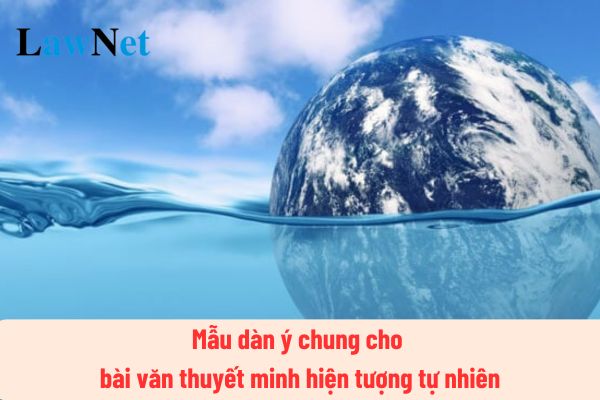What is the common sample outline of expositive essays on natural phenomena in Vietnam? What is the grade at which writing practice in the Literature curriculum includes the preparation of the common outline for expository essays?
What is the sample common outline of expositive essays on natural phenomena in Vietnam?
A natural phenomenon is an event or process occurring in nature that is not directly caused by humans. These can be changes in climate, geology, biology, or interactions between these elements.
Natural phenomena include:
Meteorological phenomena: rain, sunshine, thunder, storms, snow, fog...
Hydrological phenomena: tides, tsunamis, floods...
Geological phenomena: earthquakes, volcanoes, erosion, seismic activities...
Biological phenomena: growth, development, reproduction of living species...
|
Sample common outline of expositive essays on natural phenomena in Vietnam
|
*Note: The information above is for reference only./

What is the common sample outline of expositive essays on natural phenomena in Vietnam? What is the grade at which writing practice in the Literature curriculum includes the preparation of the common outline for expository essays? (Image from the Internet)
Is the common outline for expository essays a required learning outcome for 8th-grade writing practice in Vietnam?
According to Section 5 of Circular 32/2018/TT-BGDDT, the required learning outcomes for writing practice in the 8th-grade Literature curriculum are as follows:
WRITING
Writing process
Ability to write documents ensuring the steps: preparation before writing (determining the topic, purpose, audience, form, gathering information, materials); brainstorming and outlining; writing; reviewing and editing, learn from experience.
Writing practice
- Being able to write a narrative essay recounting a trip or a social activity that has left a deep impression on oneself, using descriptive or expressive elements, or both in the text.
- Initially being able to write free verse poetry (six or seven syllables). Writing a paragraph expressing thoughts on a free verse poem.
- Writing an argumentative essay about a life issue, presenting the issue and the writer’s opinion (agreeing or disagreeing) on the matter; providing persuasive reasoning and evidence.
- Writing an analysis of a literary work: stating the theme; citing and analyzing the effect of several distinctive artistic features used in the work.
- Writing an expository essay explaining a natural phenomenon or introducing a book; stating key information; presenting clearly and convincingly.
- Writing a proposal on an issue of life.
>>>Download details of the General Education Program in Literature.
Are lower secondary school students in Vietnam allowed to fight in school?
Under Article 37 of the lower secondary school, upper secondary school and multi-level school charter issued with Circular 32/2020/TT-BGDDT, the prohibited acts for lower secondary school students in Vietnam are as follows:
Prohibited acts for students
1. Disrespect the dignity, honor or bodily integrity of teachers, officials and staff of their schools, other people and other students.
2. Act dishonestly in learning, examinations or admission process.
3. Buy, sell or use alcohol, tobacco, drugs, other stimulants, firecrackers or explosives.
4. Use mobile phones and other devices in class for purposes other than learning and without the teacher's permission.
5. Fight or disrupt public or school order or security.
6. Use or exchange cultural products that incite violence or contain indecent materials; use toys or play games that impede their own healthy development.
7. Students shall not commit other prohibited acts provided for by regulations of law.
Thus, lower secondary school students are not allowed to fight in school.

